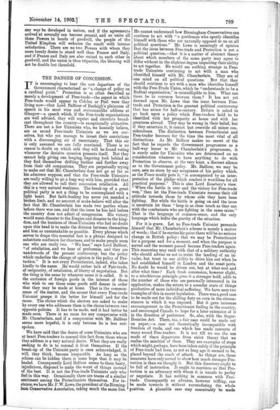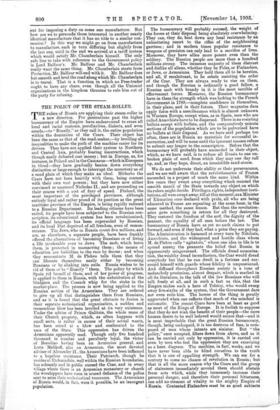THE DANGER OF CONCESSION.
IT is encouraging to hear the new departure of the Government characterised as " a change of policy on a cardinal point." Protection is so often described as merely a development of Free-trade—the aspect in which Free-trade would appear to Cobden or Peel were they living now—that Lord Balfour of Burleigh's plainness of spmch in his most wise and statesmanlike address at Glasgow—a speech which, if the Free-trade organisations are well advised, they will reprint and circulate broad- cast throughout the country—is exceptionally attractive. There are not a few Unionists who, we honestly believe, are as sound Free-trade Unionists as we are our- selves, but who vet manage to invest their convictions with a discouraging air of uncertainty. That this air is only assumed we are fully convinced. There is no reason to doubt on which side they will be found voting Whenever the decisive occasion presents itself. But they cannot help giving one longing, lingering look behind as they find themselves drifting further and further away from their old companions. They are perpetually trying to make out that Mr. Chamberlain does not go so far as his admirers suppose, and that the Free-trade Unionists are really willing to go a long way with him, provided that they are allowed to call their concession retaliation. All this is a very natural weakness. The break-up of a great political party is not a thing to be contemplated. with a light heart. But faith-healing has never yet mended a broken limb, and no amount of make-believe will alter the fact that Mr. Chamberlain has made two parties where before there was one, and that the issue he has laid before the country does not admit of compromise. His victory would mean disaster to the Empire and disaster to the king- dom, and the business of those Unionists who feel no doubt upon this head is to make the division between themselves and him as unmistakable as possible. Every phrase which serves to drape this essential fact is a phrase designed to substitute confusion for clearness, and to make people seem one wbo are really two. " We hear," says Lord Balfour, "of retaliation, and we hear of preference, and they are watchwords of the present controversy, but the policy which underlies the change of opinion is the policy of Pro- tection." It is not every Protectionist, indeed, who takes kindly to the name. He would rather talk of Fair-trade, of reciprocity, of retaliation, of liberty of negotiation. But the thing is the same by whatever name it is called. It is the exclusion of foreign goods in the interest of those who wish to see those same goods sold dearer in order that they may be made at home. That is the common- sense of the matter, and the sooner that every Free-trade Unionist grasps it the better for himself and for the cause. The choice which the electors are asked to make by every one who addresses them is the choice between two opposite policies. It has to be made, and it had better be made soon. There is no room for any compromise with Mr. Chamberlain, and if a compromise with Mr. Balfour seems more hopeful, it is only because he is less out- spoken.
We have said that the desire of some Unionists who are at heart Free-traders to conceal this fact from those whom they address is a very natural desire. What they are really seeking to do is to conceal it from themselves. If the break-up of the Unionist party is once acknowledged, it will, they think, become irreparable. As long as the schism can be hidden there is some hope that it may be healed. Consequently Lord Balfour seems to them hasty, injudicious, disposed to make the worst of things instead of the best. It is not the Free-trade Unionists only who feel in this way. Occasionally there are traces of a similar sentiment among the Protectionists themselves. For in- stance, we have Mr. F. W. Lowe, the president of the Birming- ham Conservative Association, taking much' the same line. He cannot understand how Birmingham Conservatives can continue to act with " a gentleman who openly identifies himself with those who are naturally opposed to us on all political questions." Mr. Lowe is seemingly of opinion that the issue between Free-trade and Protection is not a political question,—that it is a matter of abstract theory about which members of the same party may agree to differ without in the slightest degree impairing their ability to act together. He would see nothing strange in Free- trade Unionists continuing to act with a man who identified himself with Mr. Chamberlain. They are of one mind on all political questions. But that they should continue to act with a man who identifies himself with the Free-Trade Union, which he "understands to be a Radical organisation," is unintelligible to him. What can there be in common between them ? It has not yet dawned upon Mr. Lowe that the issue between Free- trade and Protection is the greatest political controversy that has arisen for half-a-century. Britain is asked to go back upon a policy which Free-traders hold to be identified with her prosperity at home and with her greatness abroad. They may be wrong in their belief, but if they entertain it, it cannot but override all minor con- siderations. The distinction between Protectionist and Free-trader becomes for the time the most vital of all distinctions. As Mr. Balfour makes no secret of the fact that he regards the Government programme as a half-way house to Mr. Chamberlain's programme, it is surely safer for Unionists who are determined on no consideration whatever to have anything to do with Protection to observe, at the very least, a discreet silence as to the Government policy. Mr. Balfour, we may be sure, sets no store by any acceptance of his policy which, as the Times neatly puts it, " is accompanied by an inter- pretation of the pledge which renders it worthless for all practical purposes." This is also Lord Rosebery's view. " When the battle is over and the victory for Free-trade won," then let the Free-trade Unionists resume their old attitude towards those by whose side they have been fighting. But while the battle is going on and the issue is uncertain let them " keep in as close touch as they can with the combatants who are fighting in the same cause." That is the language of common-sense, and the only language which befits the gravity of the situation.
For it is grave. Let no Free-trade Unionist persuade himself that Mr. Chamberlain's scheme is merely a matter of words ; that if he carries his point there will be no serious change in British policy ; that we may be Protectionist for a purpose and for a moment, and when the purpose is served and the moment passed become Free-traders again. This reasoning may rank with that of a military authority who should. advise us not to resist the landing of an in- vader, but trust to our ability to drive him out when he had established himself in London and the coast ports. No doubt he would be driven out, but at what cost and after what time ? Each fresh concession, however slight, to a mischievous principle gives it a stronger hold, adds to the number of those who are personally interested. in its application, makes the return to a sounder state of things productive of more individual suffering. We have seen two examples of this in recent legislation. There was a good case to be made out for the shilling duty on corn in the circum- stances in which it was imposed. But it gave immense encouragement to the Protectionist feeling in the country, and encouraged Canada to hope for a later extension of it in the direction of preference. So, also, with the Sugar- Bounties Act. There, too, a fair case could be made out on paper,—a case not theoretically incompatible with freedom of trade, and one which has made converts of many sound Free-traders. It is not till we see the use made of these departures from strict theory that we realise the mischief of them. They are examples of steps which might, perhaps, have been taken safely if the principle of Free-trade had been, as not so long ago it seemed to be, placed beyond the reach of attack. As things are, these measures have only served to show how much stronger Pro- tection is than we thought it. But this discovery ought to be full of instruction. It ought to convince us that Pro- tection is an adversary with whom it is unsafe to parley or negotiate. It has nothing in common with Free- trade. Consequently no advance, however trifling, can be made towards it without surrendering the whole position. A plausible case may conceivably be made out for imposing a duty on some one manufacture. But how are we to persuade those interested in another nearly identical manufacture that it has no title to a similar con- cession ? In this way we might go on from manufacture to manufacture, each in turn differing but slightly from the last one, until in the end we arrived at a tariff system, which would satisfy Mr. Chamberlain himself. The only safe line to take with reference to the Government policy is Lord Balfour's. Mr. Balfour and Mr. Chamberlain really want the same thing. Mr. Chamberlain starts from Protection, Mr. Balfour will end with it. Mr. Balfour does but smooth and level the road along which Mr. Chamberlain is to travel. That is a function, in which no Free-trader ought to have any share, even though all the Unionist organisations in the kingdom threaten to rule him out of the party for refusing.















































 Previous page
Previous page